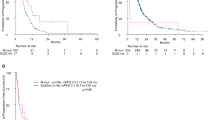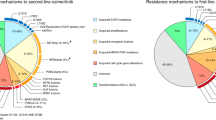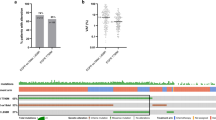Abstract
The−216G/T, −191C/A, intron 1 and Arg497Lys epidermal growth factor receptor (EGFR) polymorphisms were evaluated in 92 advanced non-small-cell lung cancer patients treated with gefitinib, an EGFR tyrosine-kinase inhibitor. Improved progression free survival (PFS) was found in patients homozygous for the shorter lengths of intron 1 polymorphism (S/S; S=16 or fewer CA repeats; log-rank test (LRT) P=0.03) and for patients carrying any T allele of the −216G/T polymorphism (LRT, P=0.005). When considered together, patients with intron 1 S/S genotype and at least one T allele of −216G/T had improved PFS (LRT P=0.0006; adjusted hazard ratio (AHR), 0.60 (95% confidence interval, 0.36–0.98)) and overall survival (LRT P=0.02; AHR, 0.60 (0.36–1.00)) when compared with all others. The T allele of −216G/T was also associated with significantly higher rates of stable disease/partial response (P=0.01) and a significantly higher risk of treatment-related rash/diarrhea (P=0.004, multivariate model). EGFR intron 1 and –216G/T polymorphisms influence clinical outcomes in gefitinib-treated non-small-cell lung cancer patients.
This is a preview of subscription content, access via your institution
Access options
Subscribe to this journal
Receive 6 print issues and online access
$259.00 per year
only $43.17 per issue
Buy this article
- Purchase on Springer Link
- Instant access to full article PDF
Prices may be subject to local taxes which are calculated during checkout



Similar content being viewed by others
Abbreviations
- BAC:
-
Bron chiolo-alveolar carcinoma
- ECOG:
-
Eastern Cooperative Oncology Group
- PD:
-
progressive disease
- PR:
-
partial response
- SD:
-
stable disease
References
Herbst RS, Fukuoka M, Baselga J . Gefitinib – a novel targeted approach to treating cancer. Nat Rev Cancer 2004; 4: 956–965.
Kris MG, Natale RB, Herbst RS, Lynch Jr TJ, Prager D, Belani CP et al. Efficacy of gefitinib, an inhibitor of the epidermal growth factor receptor tyrosine kinase, in symptomatic patients with non-small cell lung cancer: a randomized trial. JAMA 2003; 290: 2149–2158.
Lynch TJ, Bell DW, Sordella R, Gurubhagavatula S, Okimoto RA, Brannigan BW et al. Activating mutations in the epidermal growth factor receptor underlying responsiveness of non-small-cell lung cancer to gefitinib. N Engl J Med 2004; 350: 2129–2139.
Paez JG, Janne PA, Lee JC, Tracy S, Greulich H, Gabriel S et al. EGFR mutations in lung cancer: correlation with clinical response to gefitinib therapy. Science 2004; 304: 1497–1500.
Cappuzzo F, Hirsch FR, Rossi E, Bartolini S, Ceresoli GL, Bemis L et al. Epidermal growth factor receptor gene and protein and gefitinib sensitivity in non-small-cell lung cancer. J Natl Cancer Inst 2005; 97: 643–655.
Varella-Garcia M, Xavier AC, Shigematsu H et al. Gefitinib sensitivity in non-small cell lung cancer (NSCLC) cell lines associates with mutation and amplification of the epidermal growth factor receptor (EGFR) gene. Proc Am Assoc Cancer Res 2005; 46: abstr1667.
Bell DW, Lynch TJ, Haserlat SM, Harris PL, Okimoto RA, Brannigan BW et al. Epidermal growth factor receptor mutations and gene amplification in non-small-cell lung cancer: molecular analysis of the IDEAL/INTACT gefitinib trials. J Clin Oncol 2005; 23: 8081–8092.
Liu W, Innocenti F, Wu MH, Desai AA, Dolan ME, Cook Jr EH et al. A functional common polymorphism in a Sp1 recognition site of the epidermal growth factor receptor gene promoter. Cancer Res 2005; 65: 46–53.
Maekawa T, Imamoto F, Merlino GT, Pastan I, Ishii S . Cooperative function of two separate enhancers of the human epidermal growth factor receptor proto-oncogene. J Biol Chem 1989; 264: 5488–5494.
Haley JD, Waterfield MD . Contributory effects of de novo transcription and premature transcript termination in the regulation of human epidermal growth factor receptor proto-oncogene RNA synthesis. J Biol Chem 1991; 266: 1746–1753.
Gebhardt F, Zanker KS, Brandt B . Modulation of epidermal growth factor receptor gene transcription by a polymorphic dinucleotide repeat in intron 1. J Biol Chem 1999; 274: 13176–13180.
Etienne-Grimaldi MC, Pereira S, Magne N, Formento JL, Francoual M, Fontana X et al. Analysis of the dinucleotide repeat polymorphism in the epidermal growth factor receptor (EGFR) gene in head and neck cancer patients. Ann Oncol 2005; 16: 934–941.
Buerger H, Gebhardt F, Schmidt H, Beckmann A, Hutmacher K, Simon R et al. Length and loss of heterozygosity of an intron 1 polymorphic sequence of egfr is related to cytogenetic alterations and epithelial growth factor receptor expression. Cancer Res 2000; 60: 854–857.
Amador ML, Oppenheimer D, Perea S, Maitra A, Cusati G, Iacobuzio-Donahue C et al. An epidermal growth factor receptor intron 1 polymorphism mediates response to epidermal growth factor receptor inhibitors. Cancer Res 2004; 64: 9139–9143.
Zhang W, Park DJ, Lu B, Yang DY, Gordon M, Groshen S et al. Epidermal growth factor receptor gene polymorphisms predict pelvic recurrence in patients with rectal cancer treated with chemoradiation. Clin Cancer Res 2005; 11 (2 Pt 1): 600–605.
Innocenti F, Undevia SD, Iyer L, Chen PX, Das S, Kocherginsky M et al. Genetic variants in the UDP-glucuronosyltransferase 1A1 gene predict the risk of severe neutropenia of irinotecan. J Clin Oncol 2004; 22: 1382–1388.
Suk R, Gurubhagavatula S, Park S, Zhou W, Su L, Lynch TJ et al. Polymorphisms in ERCC1 and grade 3 or 4 toxicity in non-small cell lung cancer patients. Clin Cancer Res 2005; 11: 1534–1538.
Gurubhagavatula S, Liu G, Park S, Zhou W, Su L, Wain JC et al. XPD and XRCC1 genetic polymorphisms are prognostic factors in advanced non-small-cell lung cancer patients treated with platinum chemotherapy. J Clin Oncol 2004; 22: 2594–2601.
Lecomte T, Ferraz JM, Zinzindohoue F, Loriot MA, Tregouet DA, Landi B et al. Thymidylate synthase gene polymorphism predicts toxicity in colorectal cancer patients receiving 5-fluorouracil-based chemotherapy. Clin Cancer Res 2004; 10: 5880–5888.
Herbst RS, Giaccone G, Schiller JH, Natale RB, Miller V, Manegold C et al. Gefitinib in combination with paclitaxel and carboplatin in advanced non-small-cell lung cancer: a phase III trial--INTACT 2. J Clin Oncol 2004; 22: 785–794.
McKay JA, Murray LJ, Curran S, Ross VG, Clark C, Murray GI et al. Evaluation of the epidermal growth factor receptor (EGFR) in colorectal tumours and lymph node metastases. Eur J Cancer 2002; 38: 2258–2264.
Liu W, Innocenti F, Chen P, Das S, Cook Jr EH, Ratain MJ . Interethnic difference in the allelic distribution of human epidermal growth factor receptor intron 1 polymorphism. Clin Cancer Res 2003; 9: 1009–1012.
Fukuoka M, Yano S, Giaccone G, Tamura T, Nakagawa K, Douillard JY et al. Multi-institutional randomized phase II trial of gefitinib for previously treated patients with advanced non-small-cell lung cancer (The IDEAL 1 Trial). J Clin Oncol 2003; 21: 2237–2246.
Miller VA, Kris MG, Shah N, Patel J, Azzoli C, Gomez J et al. Bronchioloalveolar pathologic subtype and smoking history predict sensitivity to gefitinib in advanced non-small-cell lung cancer. J Clin Oncol 2004; 22: 1103–1109.
Tsao MS, Sakurada A, Cutz JC, Zhu CQ, Kamel-Reid S, Squire J et al. Erlotinib in lung cancer – molecular and clinical predictors of outcome. N Engl J Med 2005; 353: 133–144.
Buerger H, Packeisen J, Boecker A, Tidow N, Kersting C, Bielawski K et al. Allelic length of a CA dinucleotide repeat in the egfr gene correlates with the frequency of amplifications of this sequence – first results of an inter-ethnic breast cancer study. J Pathol 2004; 203: 545–550.
Han SW, Kim TY, Hwang PG, Jeong S, Kim J, Choi IS et al. Predictive and prognostic impact of epidermal growth factor receptor mutation in non-small-cell lung cancer patients treated with gefitinib. J Clin Oncol 2005; 23: 2493–2501.
Mitsudomi T, Kosaka T, Endoh H, Horio Y, Hida T, Mori S et al. Mutations of the epidermal growth factor receptor gene predict prolonged survival after gefitinib treatment in patients with non-small-cell lung cancer with postoperative recurrence. J Clin Oncol 2005; 23: 2513–2520.
Pao W, Miller V, Zakowski M, Doherty J, Politi K, Sarkaria I et al. EGF receptor gene mutations are common in lung cancers from ‘never smokers’ and are associated with sensitivity of tumors to gefitinib and erlotinib. Proc Natl Acad Sci USA 2004; 101: 13306–13311.
Liu G, Miller DP, Zhou W, Thurston SW, Fan R, Xu LL et al. Differential association of the codon 72 p53 and GSTM1 polymorphisms on histological subtype of non-small cell lung carcinoma. Cancer Res 2001; 61: 8718–8722.
Oken MM, Creech RH, Tormey DC, Horton J, Davis TE, McFadden ET et al. Toxicity and response criteria of the Eastern Cooperative Oncology Group. Am J Clin Oncol 1982; 5: 649–655.
Zhou W, Gurubhagavatula S, Liu G, Park S, Newberg DS, Wain JC et al. Excision repair cross-complementation group 1 polymorphism predicts overall survival in advanced non-small cell lung cancer patients treated with platinum-based chemotherapy. Clin Cancer Res 2004; 10: 4939–4943.
Therasse P, Arbuck SG, Eisenhauer EA, Wanders J, Kaplan RS, Rubinstein L et al. New guidelines to evaluate the response to treatment in solid tumors. European Organization for Research and Treatment of Cancer, National Cancer Institute of the United States, National Cancer Institute of Canada. J Natl Cancer Inst 2000; 92: 205–216.
Chi DD, Hing AV, Helms C, Steinbrueck T, Mishra SK, Donis-Keller H . Two chromosome 7 dinucleotide repeat polymorphisms at gene loci epidermal growth factor receptor (EGFR) and pro alpha 2 (I) collagen (COL1A2). Hum Mol Genet 1992; 1: 135.
Devlin B, Risch N . A comparison of linkage disequilibrium measures for fine-scale mapping. Genomics 1995; 29: 311–322.
Qin ZS, Niu T, Liu JS, Xu X . Partition-ligation-expectation-maximization algorithm for haplotype inference with single-nucleotide polymorphisms. Am J Hum Genet 2002; 71: 1242–1247.
Niu T, Qin ZS, Xu X, Liu JS . Bayesian haplotype inference for multiple linked single-nucleotide polymorphisms. Am J Hum Genet 2002; 70: 157–169.
Zhou W, Liu G, Park S, Wang Z, Wain JC, Lynch TJ et al. Gene-smoking interaction associations for the ERCC1 polymorphisms in the risk of lung cancer. Cancer Epidemiol Biomarkers Prev 2005; 14: 491–496.
Acknowledgements
We are grateful for the assistance of Peggy Suen, Barbara Bean, Karin Commeret, Andrea Shafer, Andrea Solomon, Salvatore Mucci, Richard Rivera-Massa, Dr David P Miller, and Drs Lecia Sequist, Abraham Thomas, Panos Fidias, Donna S Neuberg, and Bruce Chabner. We acknowledge AstraZeneca for providing the drug, Dr Xiping Xu for technical assistance, and Matthew Brown and Ashley Minuk for administrative assistance. This study was supported by NIH Grants CA74386, ES/CA 06409, and ES00002 (all to DCC), CA109193 and CA110822, the Doris Duke Charitable Foundation, the Kevin M Jackson Memorial Fund, and the National Cancer Institute Lung Cancer SPORE career development award (all to GL), and a FAMRI grant (to WZ).
Author information
Authors and Affiliations
Corresponding author
Additional information
Duality of Interest
Within the past 3 years, TL has received honoraria, has been a consultant, and has received research funding from AstraZeneca.
Rights and permissions
About this article
Cite this article
Liu, G., Gurubhagavatula, S., Zhou, W. et al. Epidermal growth factor receptor polymorphisms and clinical outcomes in non-small-cell lung cancer patients treated with gefitinib. Pharmacogenomics J 8, 129–138 (2008). https://doi.org/10.1038/sj.tpj.6500444
Received:
Revised:
Accepted:
Published:
Issue Date:
DOI: https://doi.org/10.1038/sj.tpj.6500444
Keywords
This article is cited by
-
Analyses of P16INK4a gene promoter methylation relative to molecular, demographic and clinical parameters characteristics in non-small cell lung cancer patients: A pilot study
Molecular Biology Reports (2023)
-
Application of the conventional and novel methods in testing EGFR variants for NSCLC patients in the last 10 years through different regions: a systematic review
Molecular Biology Reports (2021)
-
The Association between Epidermal Growth Factor Receptor Single Nucleotide Polymorphisms and Radiochemotherapy Response in Cervical Cancer
Pathology & Oncology Research (2020)
-
Genetic Association of Curative and Adverse Reactions to Tyrosine Kinase Inhibitors in Chinese advanced Non-Small Cell Lung Cancer patients
Scientific Reports (2016)
-
Frequencies of EGFR single nucleotide polymorphisms in non-small cell lung cancer patients and healthy individuals in the Republic of Serbia: a preliminary study
Tumor Biology (2016)



